#presocratic
Text
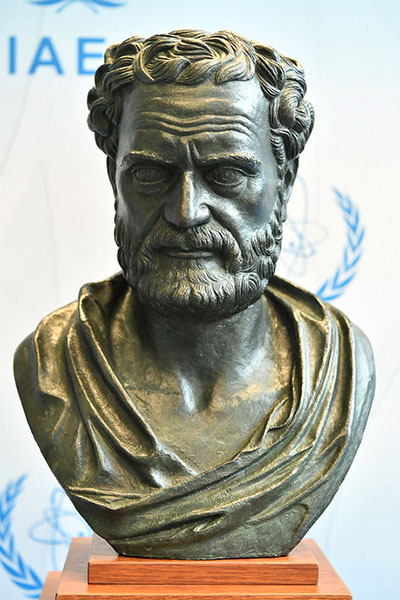
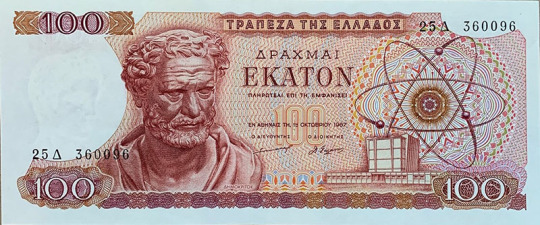
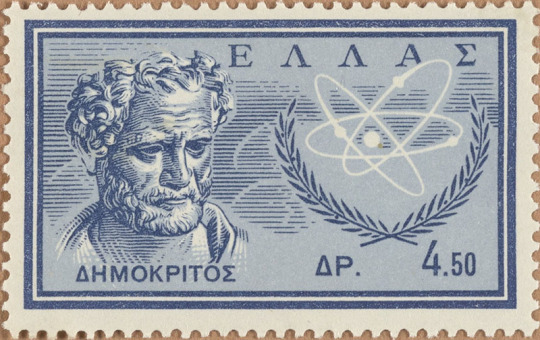
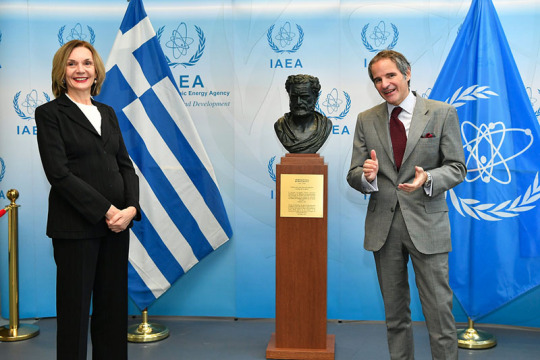
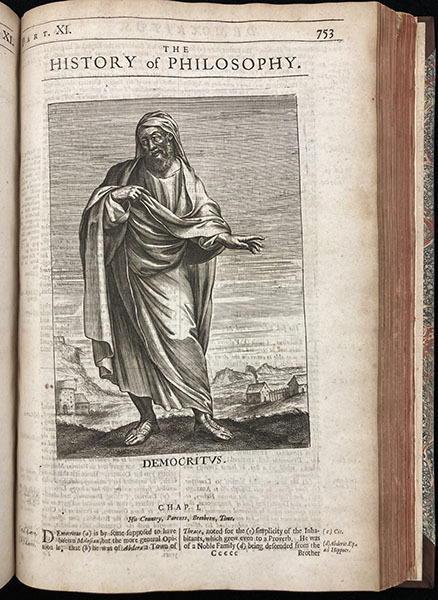
Democritus of Abdera – Scientist of the Day
Democritus of Abdera, a pre-Socratic philosopher of ancient Greece, lived from about 460 B.C.E to about 370 B.C.E.
read more...
#Democritus#atomism#presocratic#histsci#histSTM#5th century BCE#history of science#Ashworth#Scientist of the Day
15 notes
·
View notes
Quote
Blessed is he who possesses wealth of divine intelligence
but wretched is he whose concern is a dim opinion about the gods.
Empedocles of acragas (Clement, Miscellanies 5.140)
23 notes
·
View notes
Text
We should not act and speak like ones who sleep.
οὐ δεῖ ὥσπερ καθεύδοντας ποιεῖν καὶ λέγειν.
-Heraclitus, fr. 73 Diels-Kranz
#classics#tagamemnon#Greek#Greek language#Ancient Greek#Ancient Greek language#translation#Greek translation#Ancient Greek translation#Ancient Greece#ancient philosophy#Heraclitus#Presocratics#quote#quotes
123 notes
·
View notes
Text
I love the Goncharov meme conceptually. It feels like classic academia perhaps, definitely like studying ancient philosophy at times. You get a fragment (knockoff boots), a general context (Martin Scorsese films existing), and then a very long discussion about nothing starts. But the nothingness isn't entirely nothing, and there are still limits to what can and cannot be said framed by both the existence and non-existence of that which is being discussed. Hilarious, truly, and the fact itself so very interesting to analyse in so many ways.
#This feels a bit like studying and discussing presocratics or Socrate himself xD#ngl while I loved the boots thing (I had often thought about those knockoff boots‚ I found them hilarious)#I don't find the Goncharov memes particularly funny#But the concept is fascinating conceptually and thrilling to analyse in so many levels#The fact that almost every webwaving‚ even the ones about a fake film‚ have the same quotes#That basically everything said about this film is what is said about any other popular media#Is so interesting as how short media analysis falls into superficiality and miopic repetition of patterns#As is the fact that we can discuss to eternity something that doesn't exist#in a sort of Narcissus looking at his reflection on the pond situation‚ in love with our own discussion more than the thing itself#And that's a level. But it's also very interesting in how basically everyone has a very similar idea of what the film is about#How nothingness with sprinkles can tell us something‚ a lot‚ and make a ghost of a film which can effectively to some extent be analysed#It's also hilarious in how it puts a mirror‚ so to speak‚ in front of so many academic studies#How we've basically been doing this for centuries unironically and I'd say with at least a certain sense of self awareness#How this brings back studying and discussing the lost texts of Ovid or Sappho based just on what they say about them or the absence#in what they say about them‚ or what other authors say about them or how their works are wrapped around those lost texts#How it brings back the study and analysis of presocratics like Pythagoras or even Socrate himself of which we have Plato and Xenophon#but really something close to nothing considering how important those authors are as basis of the entire history of western philosophy#And yet there's honestly so much to say about them given the nothingness we have accompanied by the something!#And Goncharov memes work a bit that way#I don't know. There are really so many facets to this meme and they are all conceptually hilarious yes xD#Another but not less important aspect of this meme that I love conceptually is that#I'm a bit fan of funny lies. I adore them. Especially when constructed between several people#And Goncharov is precisely that lol#Goncharov#I talk too much#I should probably delete this later#Meme shit
34 notes
·
View notes
Photo

Hans Erni (1909-2015) — Thales of Miletus [tempera on paperboard, 1976]
142 notes
·
View notes
Text
THE WORLD OF PARMENIDES – ESSAYS ON THE PRESOCRATIC ENLIGHTMENT by Karl Popper
On the traces of our thinking - Part One

„Bright in the night, with an alien light,
Round the Earth she is drifting.
Always she wishfully looks
Out for the rays of the Sun.”
Philosopher of Science Sir Karl Raimond Popper admired the Presocratic philosophy throughout his lifetime.
Popper considers the Presocratic speculations and cosmogony as the beginning of our history of science, especially with regards to epistemology and theoretical physics.
It is believed that speculative philosophy began with the Ionians, including Thales of Miletus and his disciple Anaximander. They developed the method of critical approach or critical tradition: To approach an explanatory myth (critical revision of mythical poems such as Homer or Hesiod’s "Theogony") with critical eyes.
Even today, the verification of a theory for its truthfulness is a special feature of science.
However, one should not underestimate the importance of incorrect theories, which were able to justify the problem and refine the explanation in the first place through falsification,
since they can lead to a finer awareness of the problem again through the refutation.
With this following book, Popper wants to contribute to a better understanding of the Presocratic.
In addition, he wants to illustrate with his explanations the thesis that "history is- or should always be, the history that serves to solve the problem (...)."
Popper discusses the basic ideas of the early Greek philosophers and shows the development of a critical methodology with the legacy of the search for truth, illustrated in particular by the didactic poem by Parmenides and the parable of the two paths.

The importance of Presocratic ideas in today's science is found in the reconciliation and unification of contradictory assumptions: Nothing changes (Parmenides) and everything changes (Heraclitus).
But how is change possible in the first place and how do we come to knowledge?
It is a remarkable intellectual achievement to define different forms of knowledge and to distinguish intellectual thinking from knowledge in general.
The revelation of the goddess (Ananke? Dike?) is a journey to the real and deceptive world.
An experience of rapture must have distorted Parmenides' reality of life in such a way that he depicted this lightning-like illumination in this dualistic conception.
The goddess, who describes the human world as false and deceptive, wants to reveal to Parmenides the secret truth about nature and reality, but also the false opinions of mortal men.
As mentioned above, the dualistic concept can also be found in the textual form: The poem is divided into two parts and begins with an introduction (Proömium).
The first path is described as the Path of Truth (or the Path of True Knowledge) and the second path as the Path of Human Conjecture (Path of Conjectural Knowledge).
The second part has survived only in fragments, the incompleteness is illuminated by Plutarch's reports, whereas the first part caused a sensation and was often quoted and copied.
In the first part, "The Path of Truth", the Goddess presents a radically rationalist and anti-sensualist epistemology and then leads to a purely logical proof, culminating in the thesis that there can be no movement and that the world is in truth made up of a motionless, gigantic, homogeneous and massive spherical block where nothing can happen: Neither past nor future.
This world stands in sharp contrast to the world of apparitions in part two, The Path of Human Conjecture.
This is the world as ordinary mortals experience it, the rich and varied world of movement, change, development, the colourful world of opposites, the world that distinguished night and light.
Dualistic-World-Concepts arise from the preoccupation with the question of the first substance, or in this particular case, one assumes a twofold building material (e.g. spirit > < body ; subject > < object).
“Listen! And carry away my message when you have grasped it!
Note the only two ways of inquiry that can be thought of:
One is the way that it is; and that non-being cannot be being.
That is the path of Persuasion, Truth’s handmaid; now the other!
The path is that it is not; and that it may not be being.
That path- take it from me! – is a path that just cannot be thought of.
For you can’t know what is not: It can’t be done; nor can you say it.”
[Character limit :/ ...text continues in the second part]
#Presocratic philosophy#cosmogonic questioning#ontology#epistemology#philosophy#literature#Karl Popper#Popper#philosophy of science#scientific research#history of theories#metaphysics#Parmenides#Heraclitus#substance and being#theories of conscience#eternal truth#ancient philosophy#ancient wisdom#ancient scepticism#knowledge#real knowledge#Entrückungsmoment#Xenophanes#Eleatische Schule#Ionische Schule
2 notes
·
View notes
Text
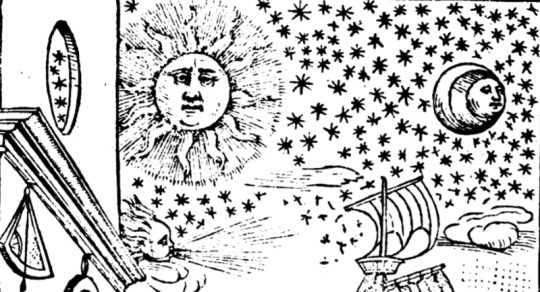
Hylozoism is the philosophical point of view that matter is in some sense alive. Hylozoism refers largely to views such as those of the earliest Greek philosophers (6th and 5th centuries BC), who treated the magnet as alive because of its attractive powers (Thales), or air as divine (Anaximenes), perhaps because of its apparently spontaneous power of movement, or because of its essentiality for life in animals. The theory holds that matter is unified with life or spiritual activity. Thales, Anaximenes, and Heraclitus all taught that there is a form of life in all material objects. It was Thales who maintained that all things are full of gods (daimon).
#philosophy#matter#presocratics#presocratic philosophy#thales#heraclitus#hylozoism#Anaximenes#material imagination
20 notes
·
View notes
Text
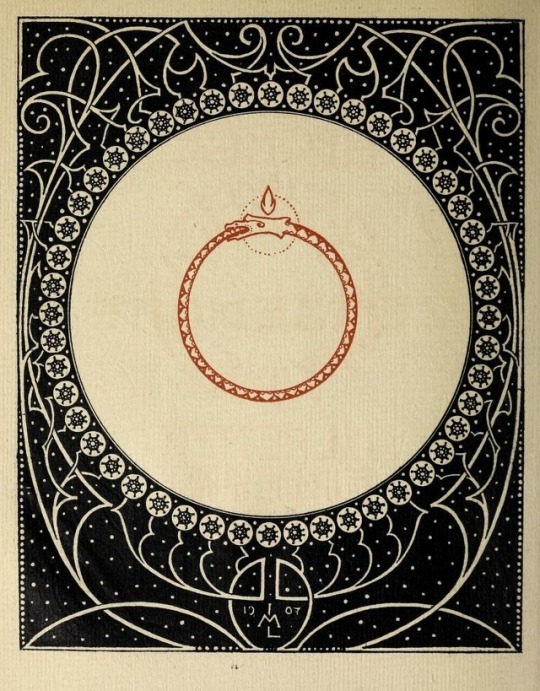
The point from which I start / Is common; for there shall I return again.
Parmenides of Elea
3 notes
·
View notes
Text
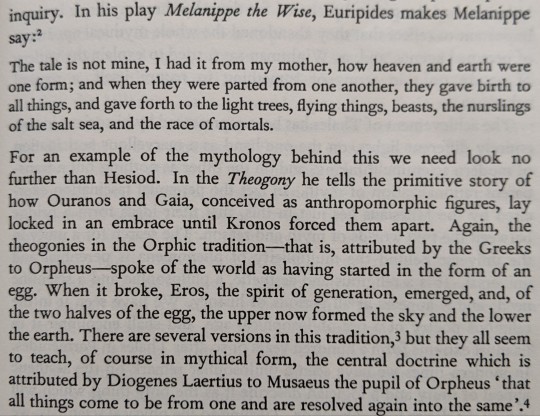
W. K. C. Guthrie, A History of Greek Philosophy I The earlier Presocratics and the Pythagoreans
#i have always loved this idea everything is one we contain multitudes as whitman says and the greatness of his poem is i a m everyone i am#all we are all we are me like violeta parra says el canto de todos que es el mismo canto#ugh#cosmogonía.#words#books#book quotes#quotes#greek stuff#greek philosophy#philosophy#presocratics#orphism#cosmogony#euripides#classics shit#~just a sinner.
8 notes
·
View notes
Text
6 notes
·
View notes
Text
To God all things are fair and good and right, but men hold somethings right and wrong.
Heraclitus Of Ephesus, Fragment 102.
#philosophy tumblr#philoblr#Ionian philosophy#greek texts#the ancients#presocratics#heraclitus#metaphysics#organized religion#God#humanity#morality#dark academia#life quotes
23 notes
·
View notes
Text
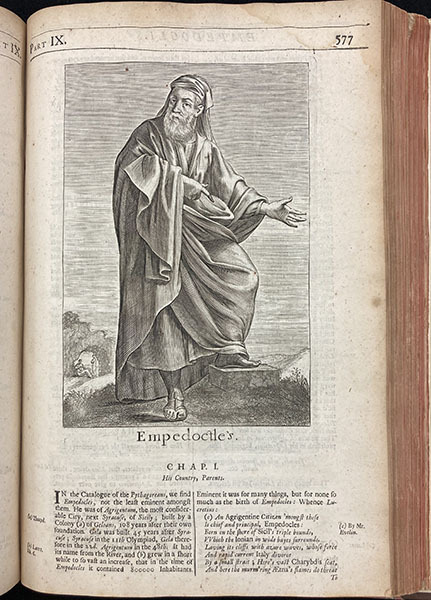
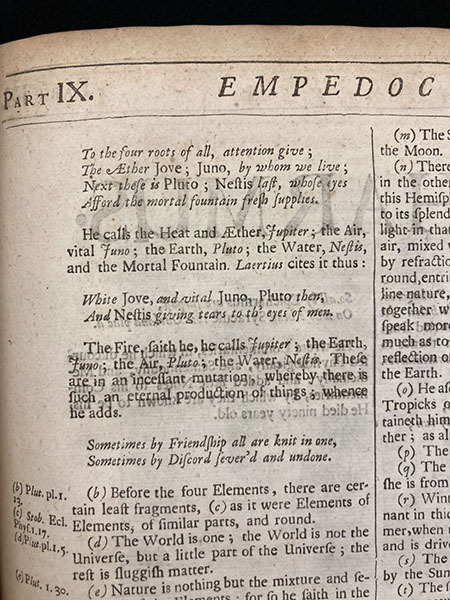
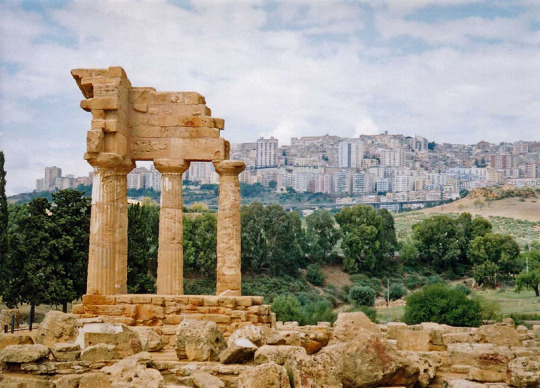
Empedocles – Scientist of the Day
Empedocles, a Greek pre-Socratic natural philosopher, lived and wrote sometime around 440 B.C.E; he was probably born around 490 and died about 434 B.C.E.
read more...
#Empedocles#pre-socratic#presocratic#histsci#histSTM#5th century BCE#history of science#Ashworth#Scientist of the Day
12 notes
·
View notes
Photo
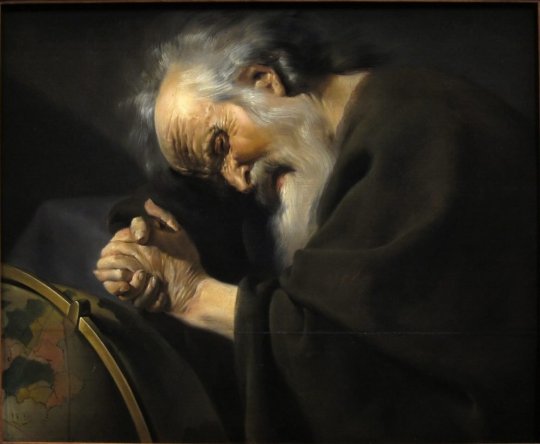
Heráclito
Johannes Moreelse
12 notes
·
View notes
Text
For humans to get all they wish would not be for the better.
ἀνθρώποις γίνεσθαι ὁκόσα θέλουσιν οὐκ ἄμεινον.
-Heraclitus, fr. 110
#classics#tagamemnon#Greek#Greek language#Ancient Greek#Ancient Greek language#translation#Greek translation#Ancient Greek translation#ancient philosophy#Heraclitus#Presocratics#fragment
67 notes
·
View notes
Text
Herodotus the Presocratic
youtube
Scarlett Kingsley on Herodotus the Presocratic
24 Νοε 2022
In this talk from the 2022-23 edition of the Herodotus Helpline, Professor Scarlett Kingsley (Agnes Scott) focuses upon the trope found in Herodotus' Histories of surpassing 'physis' to ensure victory. Professor Kingsley argues that this emphasis on transhumanism, or transcending human nature, situates Herodotus within Presocratic intellectual culture, and that Herodotus poses a challenge to those attempting to view Greek 'physis' as made of sterner stuff.
Source; the youtube channel of Herodotus Helpline ( https://www.youtube.com/watch?v=Pv6xlht3_nU).
3 notes
·
View notes
Text
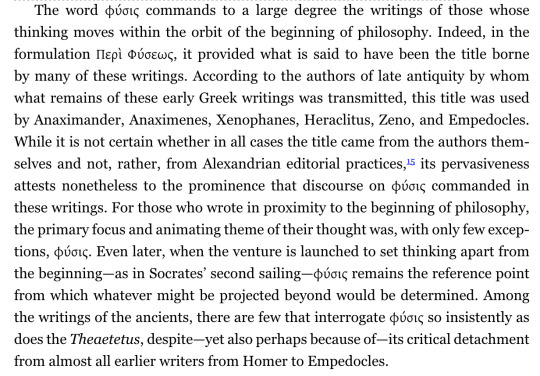
John Sallis, The Figure of Nature: On Greek Origins
1 note
·
View note